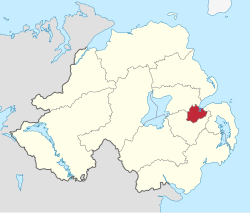
Back Belfast Afrikaans ቤልፋስት Amharic Béal Feirste AN بلفاست Arabic بلفاست ARZ Belfast AST Belfast Azerbaijani بلفاست AZB Belfast BAN Белфаст Byelorussian
City of Belfast
| |
|---|---|
| Motto(s): | |
 Belfast shown within Northern Ireland | |
| Coordinates: 54°35′47″N 05°55′48″W / 54.59639°N 5.93000°W | |
| Sovereign state | United Kingdom |
| Country | Northern Ireland |
| Incorporated | 1 April 2015 |
| Administrative HQ | City Hall |
| Government | |
| • Type | District council |
| • Body | Belfast City Council |
| • Executive | Committee system |
| • Control | No overall control |
| • MPs | 4 MPs |
| • MLAs | |
| Area | |
• Total | 51 sq mi (133 km2) |
| • Rank | 11th |
| Population (2022)[2] | |
• Total | 348,005 |
| • Rank | 1st |
| • Density | 6,780/sq mi (2,617/km2) |
| Time zone | UTC+0 (GMT) |
| • Summer (DST) | UTC+1 (BST) |
| Postcode areas |
|
| Dialling codes | 028 |
| ISO 3166 code | GB-BFS |
| GSS code | N09000003 |
| Website | belfastcity |
Belfast (/ˈbɛlfæst/ BEL-fast, /-fɑːst/ -fahst;[a] from Irish: Béal Feirste [bʲeːlˠ ˈfʲɛɾˠ(ə)ʃtʲə])[3][4] is the capital city and principal port of Northern Ireland, standing on the banks of the River Lagan and connected to the open sea through Belfast Lough and the North Channel. It is the second-largest city on the island of Ireland (after Dublin), with an estimated population of 348,005 in 2022,[2] and a metropolitan area population of 671,559.[5]
First chartered as an English settlement in 1613, the town's early growth was driven by an influx of Scottish Presbyterians. Their descendants' disaffection with Ireland's Anglican establishment contributed to the rebellion of 1798, and to the union with Great Britain in 1800 — later regarded as a key to the town's industrial transformation. When granted city status in 1888, Belfast was the world's largest centre of linen manufacture, and by the 1900s her shipyards were building up to a quarter of total United Kingdom tonnage.
Sectarian tensions accompanied the growth of an Irish Catholic population drawn by mill and factory employment from western districts. Heightened by division over Ireland's future in the United Kingdom, these twice erupted in periods of sustained violence: in 1920–22, as Belfast emerged as the capital of the six northeast counties retaining the British connection, and over three decades from the late 1960s during which the British Army was continually deployed on the streets. A legacy of conflict is the barrier-reinforced separation of Protestant and Catholic working-class districts.
Since the Good Friday Agreement, the electoral balance in the once unionist-controlled city has shifted, albeit with no overall majority, in favour of Irish nationalists. At the same time, new immigrants are adding to the growing number of residents unwilling to identify with either of the two communal traditions.
Belfast has seen significant services sector growth, with important contributions from financial technology (fintech), from tourism and, with facilities in the redeveloped Harbour Estate, from film. It retains a port with commercial and industrial docks, including a reduced Harland & Wolff shipyard and aerospace and defence contractors. Post Brexit, Belfast and Northern Ireland remain, uniquely, within both the British domestic and European Single trading areas for goods.
The city is served by two airports: George Best Belfast City Airport on the Lough shore and Belfast International Airport 15 miles (24 kilometres) west of the city. It supports two universities: on the north-side of the city centre, Ulster University, and on the southside the longer established Queens University. Since 2021, Belfast has been a UNESCO designated City of Music.
- ^ "Council". Belfast City Council. Retrieved 7 August 2024.
- ^ a b c "Mid-Year Population Estimates, UK, June 2022". Office for National Statistics. 26 March 2024. Retrieved 3 May 2024.
- ^ McKay, Patrick (2007). A Dictionary of Ulster Place-Names (2nd ed.). Belfast: Cló Ollscoil na Banríona / Queen's University Press. p. 21. ISBN 978-0-85389-896-2.
- ^ Cite error: The named reference
Logainmwas invoked but never defined (see the help page). - ^ "Belfast Population 2024". worldpopulationreview.com. Retrieved 22 January 2024.
Cite error: There are <ref group=lower-alpha> tags or {{efn}} templates on this page, but the references will not show without a {{reflist|group=lower-alpha}} template or {{notelist}} template (see the help page).







